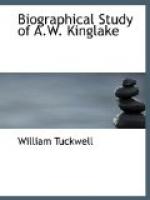“Kinglake, dear to poetry,
And dear to all his friends.”
Dr. Gatty remembers his “determined pale face”; thinks that he made his mark on the river rather than in the playing fields, being a good oar and swimmer. His great friend at school was Savile, the “Methley” of his travels, who became successively Lord Pollington and Earl of Mexborough. The Homeric lore which Methley exhibited in the Troad, is curiously illustrated by an Eton story, that in a pugilistic encounter with Hoseason, afterwards an Indian Cavalry officer, while the latter sate between the rounds upon his second’s knee, Savile strutted about the ring, spouting Homer.
Kinglake entered at Trinity, Cambridge, in 1828, among an exceptionally brilliant set—Tennyson, Arthur Hallam, John Sterling, Trench, Spedding, Spring Rice, Charles Buller, Maurice, Monckton Milnes, J. M. Kemble, Brookfield, Thompson. With none of them does he seem in his undergraduate days to have been intimate. Probably then, as afterwards, he shrank from camaraderie, shared Byron’s distaste for “enthusymusy”; naturally cynical and self-contained, was repelled by the spiritual fervour, incessant logical collision, aggressive tilting at abuses of those young “Apostles,” already
“Yearning for the large excitement that the coming years would yield, Eager-hearted as a boy when first he leaves his father’s field,”
waxing ever daily, as Sterling exhorted, “in religion and radicalism.” He saw life differently; more practically, if more selfishly; to one rhapsodizing about the “plain living and high thinking” of Wordsworth’s sonnet, he answered: “You know that you prefer dining with people who have good glass and china and plenty of servants.” For Tennyson’s poetry he even then felt admiration; quotes, nay, misquotes, in “Eothen,” from the little known “Timbuctoo”; {3} and from “Locksley Hall”; and supplied long afterwards an incident adopted by Tennyson in “Enoch Arden,”
“Once likewise in the ringing of his ears
Though faintly, merrily—far and far away
—
He heard the pealing of his parish bells,” {4}
from his own experience in the desert, when on a Sunday, amid overpowering heat and stillness, he heard the Marlen bells of Taunton peal for morning church. {5}
In whatever set he may have lived he made his mark at Cambridge. Lord Houghton remembered him as an orator at the Union; and speaking to Cambridge undergraduates fifty years later, after enumerating the giants of his student days, Macaulay, Praed, Buller, Sterling, Merivale, he goes on to say: “there, too, were Kemble and Kinglake, the historian of our earliest civilization and of our latest war; Kemble as interesting an individual as ever was portrayed by the dramatic genius of his own race; Kinglake, as bold a man-at-arms in literature as ever confronted public opinion.” We know, too, that not many years after leaving Cambridge he received, and refused, a solicitation to stand as Liberal representative




